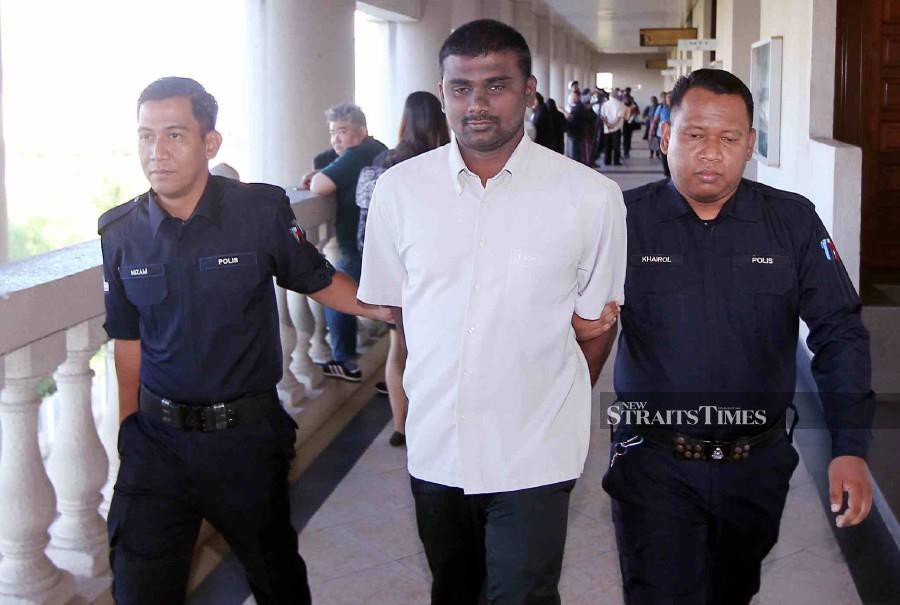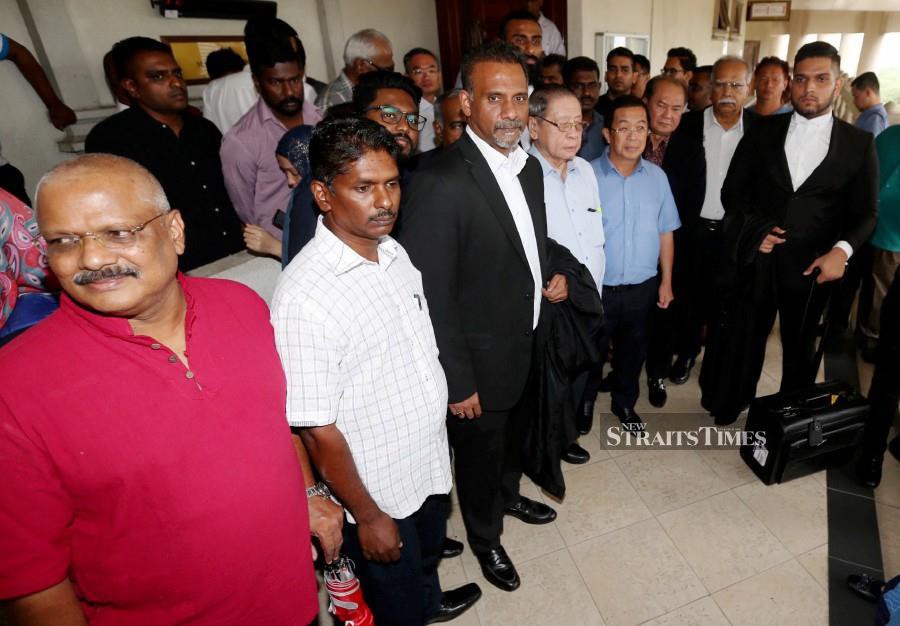After Cradle CEO’s widow allowed bail, we take a look at how bail works in Malaysia

KUALA LUMPUR, June 5 — The Federal Court’s recent decision to allow
bail for Samirah Muzaffar, charged with murdering her husband and Cradle
Fund CEO Nazrin Hassan, has stunned many, both in the legal fraternity
and outside.
This is because murder, under Section 302 of the Penal Code, is a
capital crime and remains punishable with death even after the Pakatan
Harapan (PH) government’s recent legal reforms; it is a non-bailable
offence.
Because many were left wondering if they had read or heard the news right, Malay Mail sought the expert views of several lawyers to find out what the court decision meant, and how it came to be.
Precedent
Seasoned criminal lawyer Datuk Geethan Ram Vincent said Samirah’s bail for murder was not the first allowed in the country.
He recalled the case of a former lawyer, the late Datuk Balwant
Singh, who was similarly charged under Section 302 of the Penal Code for
shooting and killing despatch rider Gobala Krishnan in Bangsar, Kuala
Lumpur in 2002.
Balwant, 81 at the time, was granted bail after the court took into
account his age and health. He was later found not guilty and acquitted
in 2003.
“Other than the case of Datuk Balwant Singh which was a decision in
2003, there has never been a decision where a person charged with a
capital offence is released on bail pending trial, so this is a landmark
decision,” Geethan told Malay Mail.
How bail works
Let’s look at how bail works in Malaysia. Essentially, there are
three categories of offences: Bailable, non-bailable and unbailable.
As a general rule, bailable offences are those punishable with less than three years in jail and/or with fines.
Non-bailable offences are those punishable with three years’
imprisonment or more, or by death. Here, bail may be given at the
discretion of the courts.
Non-bailable offences can be further divided into two categories. If
the offence is not punishable with the death penalty or life
imprisonment, then bail may be allowed by the courts.
But if the offence is punishable with death or life imprisonment,
then bail shall not be allowed, unless one: There is no reasonable
grounds that the accused has committed such offence; or two: If the
accused is a woman, or is a child below 16 years old, or is infirm or a
sick person.
For the record, Samirah was released on bail because murder is categorised as a non-bailable offence.
In Balwant’s case back in 2003, he was allowed bail because he was
both sick and infirm, while in Samirah’s case, it appears to be because
she is a woman.
It needs to be made clear that the purpose of bail is not to punish;
the person charged is presumed innocent until proven guilty, which is
the basic tenet of the justice system. This is why there are trials.
Bail is only to make sure the person charged turns up in court for
the duration of the trial, as explained in the Malaysian Bar website.

Lawyer and academic Shamsher Singh Thind explained that unbailable
offences are not under the Penal Code, citing as example offences under
the Dangerous Drugs Act 1952 and the Security Offences (Special Measures
Act) 2012.
“Unbailable offences do not fall under the Penal Code, and are those
which the courts simply have no discretion to grant any bail, regardless
of the punishment the offences carry, or the gender, age or the health
condition of the accused.
“Examples are the offences of drug trafficking and of smuggling of migrants,” he told Malay Mail.
Samirah’s bail of RM500,000 was posted on May 29, a day after the
Federal Court allowed her to do so with two sureties pending trial
scheduled to begin on September 3.
A former senior executive with the Intellectual Property Corporation
of Malaysia and a mother of two, she was charged on March 12 with
murdering Nazrin at a house in Mutiara Homes, Shah Alam between 11.30pm
on June 13, 2018, and 4am on June 14, 2018 alongside two juveniles and
an Indonesian woman Eka Wahyu Lestari who remains at large.
The charge under Section 302 of the Penal Code read together with
Section 34 of the same law provides for the mandatory death sentence
upon conviction and is a non-bailable offence.
However, the High Court in Shah Alam allowed bail for the two
teenagers in March with the amount set at RM50,000 each with two
sureties.
Samirah appealed for bail at the same time, but was denied by the
same court then with the judge citing a high probability that she would
abscond as well as possible tampering with witnesses.
The Federal Court overruled the High Court on May 28.
What Samirah’s bail signals
Geethan thinks the Federal Court decision is progressive.
“We welcome this decision because it’s a development in the law. At
the end of the day, this is opportunity, so in future, where there are
cases of a similar nature, we know for a fact that a precedent has been
set, that bail can be allowed in specific circumstances.
“The judge had rightly considered the facts of the case whereby he
considered that she had two very young children and certain conditions
have been laid for the bail to be allowed. Also, the bail amount is
RM500,00 which is a very stiff amount. I think that is an amount that is
reasonable to ensure she does not jump bail,” he said, adding that her
passport has been impounded and she has to report to the nearest police
station to her home regularly.
Shamsher too welcomed the top court’s decision to allow bail in
Samirah’s case but expressed disappointment with the sexist clause in
the law.
He believes that Section 388(1) of the Criminal Procedure Code,
though interpreted correctly by the Federal Court, should be amended to
be fair to all accused persons, regardless of their gender.
“I think that if you want to say that a healthy woman is able to get
bail because she’s a woman, but a healthy man cannot get bail because he
is a man, and that he has to be sick, old or below 16 to get bail, then
this is not progressive. It is not balanced,” he said.
He also suggested another change in the law on bail, saying those who
are willing to co-operate and who especially have no proven history of
violent crimes could be allowed bail, and advocated the use of
electronic monitoring device to track the movements of the accused
person.
“When the laws on bail were being drafted, we were not that
technologically advanced. Now we are living in the era of GPS and smart
gadgets. What is the logic of locking people up for years on mere
suspicious grounds, when their crimes are yet to be proven? Is the
government willing to compensate those who are later acquitted by the
courts?” he asked.

Senior criminal lawyer Suzana Norlihan Ujen echoed Shamser’s
sentiment, saying it could create another imbalance in the justice
system between the rich and poor.
While she welcomed the Federal Court decision to allow bail in
extenuating circumstances, she said that in Samirah’s case, there were
none.
“The advantage is that after this, all cases can be bailed. So that
means, we can save in terms of not having to pay the cost of keeping the
accused in prison, paying for their food and drinks, and they also have
the opportunity to look for witnesses. But there is also a possibility
of tampering with witnesses,” she said.
“Meaning to say, is the court willing to give bail even when there
are no special circumstances? Just because one’s client will not tamper
with the witness, or is innocent until proven guilty. Would that just be
the main reasons for bail to be given?
“If let’s say those are the reasons, that means in Malaysia there is
no need for a classification between non-bailable offence, unbailable
offence and bailable offence,” she told Malay Mail.
She also said that the possibility of bail jumping for those charged
with capital offences may still happen, especially if the accused is
rich.
“Even in the case of Altantuya, just imagine, the accused was able to
flee to Australia, without people knowing,” she said, referring to
former police commando Sirul Azhar Umar who fled to Australia after
being convicted in 2013 of the 2006 murder of Mongolian model Altantuya
Shaariibuu.
Sirul is currently under detention there and will not be sent back to
Malaysia as Australia’s laws forbid it to deport anyone to a country
where they face a death sentence.
“So that means the effect is that, at the end of the day, the rich people can escape,” Suzana said.
Another lawyer, Latheefa Koya, is all for bail to be allowed to an
accused person, even for serious crimes, citing the fundamental
principle that one is innocent until proven guilty.
The only caveat for her is if there is a legitimate concern of flight risk or interfering with witnesses.
“Deputy public prosecutors should abandon the knee-jerk reaction of
objecting the bail, and instead focus on agreeing to conditions of bail.
“In this case, she is a parent of young children, and depriving them
of their mother without compelling grounds would be grossly unfair.
“Just because a person is in the dock, it does not mean they’re
guilty, and this is often forgotten by the DPPs, court and lawyers
sometimes,” Latheefa added, using the abbreviation for deputy public
prosecutors. - Malay Mail, 5/6/2019


